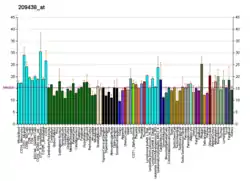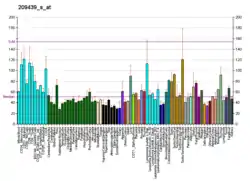PHKA2
Phosphorylase b kinase regulatory subunit alpha, liver isoform is an enzyme that in humans is encoded by the PHKA2 gene.[5][6]
References
- GRCh38: Ensembl release 89: ENSG00000044446 - Ensembl, May 2017
- GRCm38: Ensembl release 89: ENSMUSG00000031295 - Ensembl, May 2017
- "Human PubMed Reference:". National Center for Biotechnology Information, U.S. National Library of Medicine.
- "Mouse PubMed Reference:". National Center for Biotechnology Information, U.S. National Library of Medicine.
- Willems P (Sep 1990). "Families with X-linked liver glycogenosis due to phosphorylase kinase deficiency". Clin Genet. 38 (1): 80. doi:10.1111/j.1399-0004.1990.tb03552.x. PMID 2387090.
- "Entrez Gene: PHKA2 phosphorylase kinase, alpha 2 (liver)".
Further reading
- Davidson JJ, Ozçelik T, Hamacher C, et al. (1992). "cDNA cloning of a liver isoform of the phosphorylase kinase alpha subunit and mapping of the gene to Xp22.2-p22.1, the region of human X-linked liver glycogenosis". Proc. Natl. Acad. Sci. U.S.A. 89 (6): 2096–100. doi:10.1073/pnas.89.6.2096. PMC 48603. PMID 1372435.
- Wauters JG, Bossuyt PJ, Davidson J, et al. (1992). "Regional mapping of a liver alpha-subunit gene of phosphorylase kinase (PHKA) to the distal region of human chromosome Xp". Cytogenet. Cell Genet. 60 (3–4): 194–6. doi:10.1159/000133334. PMID 1505214.
- Daube H, Billich A, Mann K, Schramm HJ (1991). "Cleavage of phosphorylase kinase and calcium-free calmodulin by HIV-1 protease". Biochem. Biophys. Res. Commun. 178 (3): 892–8. doi:10.1016/0006-291X(91)90975-D. PMID 1872871.
- Willems PJ, Gerver WJ, Berger R, Fernandes J (1990). "The natural history of liver glycogenosis due to phosphorylase kinase deficiency: a longitudinal study of 41 patients". Eur. J. Pediatr. 149 (4): 268–71. doi:10.1007/BF02106291. PMID 2303074.
- Huijing F, Fernandes J (1969). "X-chromosomal inheritance of liver glycogenosis with phosphorylase kinase deficiency". Am. J. Hum. Genet. 21 (3): 275–84. PMC 1706412. PMID 5306139.
- Hirono H, Hayasaka K, Sato W, et al. (1995). "Isolation of cDNA encoding the human liver phosphorylase kinase alpha subunit (PHKA2) and identification of a missense mutation of the PHKA2 gene in a family with liver phosphorylase kinase deficiency". Biochem. Mol. Biol. Int. 36 (3): 505–11. PMID 7549948.
- Hendrickx J, Coucke P, Dams E, et al. (1995). "Mutations in the phosphorylase kinase gene PHKA2 are responsible for X-linked liver glycogen storage disease". Hum. Mol. Genet. 4 (1): 77–83. doi:10.1093/hmg/4.1.77. PMID 7711737.
- van den Berg IE, van Beurden EA, Malingré HE, et al. (1995). "X-linked liver phosphorylase kinase deficiency is associated with mutations in the human liver phosphorylase kinase alpha subunit". Am. J. Hum. Genet. 56 (2): 381–7. PMC 1801119. PMID 7847371.
- Wüllrich A, Hamacher C, Schneider A, Kilimann MW (1993). "The multiphosphorylation domain of the phosphorylase kinase alpha M and alpha L subunits is a hotspot of differential mRNA processing and of molecular evolution". J. Biol. Chem. 268 (31): 23208–14. PMID 8226841.
- Hendrickx J, Coucke P, Bossuyt P, et al. (1993). "X-linked liver glycogenosis: localization and isolation of a candidate gene". Hum. Mol. Genet. 2 (5): 583–9. doi:10.1093/hmg/2.5.583. PMID 8518797.
- Hendrickx J, Dams E, Coucke P, et al. (1997). "X-linked liver glycogenosis type II (XLG II) is caused by mutations in PHKA2, the gene encoding the liver alpha subunit of phosphorylase kinase". Hum. Mol. Genet. 5 (5): 649–52. doi:10.1093/hmg/5.5.649. PMID 8733133.
- Burwinkel B, Shin YS, Bakker HD, et al. (1997). "Mutation hotspots in the PHKA2 gene in X-linked liver glycogenosis due to phosphorylase kinase deficiency with atypical activity in blood cells (XLG2)". Hum. Mol. Genet. 5 (5): 653–8. doi:10.1093/hmg/5.5.653. PMID 8733134.
- Burwinkel B, Amat L, Gray RG, et al. (1998). "Variability of biochemical and clinical phenotype in X-linked liver glycogenosis with mutations in the phosphorylase kinase PHKA2 gene". Hum. Genet. 102 (4): 423–9. doi:10.1007/s004390050715. PMID 9600238.
- Hendrickx J, Bosshard NU, Willems P, Gitzelmann R (1999). "Clinical, biochemical and molecular findings in a patient with X-linked liver glycogenosis followed for 40 years". Eur. J. Pediatr. 157 (11): 919–23. doi:10.1007/s004310050967. PMID 9835437.
- Hendrickx J, Lee P, Keating JP, et al. (1999). "Complete genomic structure and mutational spectrum of PHKA2 in patients with x-linked liver glycogenosis type I and II". Am. J. Hum. Genet. 64 (6): 1541–9. doi:10.1086/302399. PMC 1377897. PMID 10330341.
- Strausberg RL, Feingold EA, Grouse LH, et al. (2003). "Generation and initial analysis of more than 15,000 full-length human and mouse cDNA sequences". Proc. Natl. Acad. Sci. U.S.A. 99 (26): 16899–903. doi:10.1073/pnas.242603899. PMC 139241. PMID 12477932.
- Ban K, Sugiyama K, Goto K, et al. (2004). "Detection of PHKA2 gene mutation in four Japanese patients with hepatic phosphorylase kinase deficiency". Tohoku J. Exp. Med. 200 (1): 47–53. doi:10.1620/tjem.200.47. PMID 12862311.
- Pallen MJ (2004). "Glucoamylase-like domains in the alpha- and beta-subunits of phosphorylase kinase". Protein Sci. 12 (8): 1804–7. doi:10.1110/ps.0371103. PMC 2323967. PMID 12876330.
- Johnson JM, Castle J, Garrett-Engele P, et al. (2004). "Genome-wide survey of human alternative pre-mRNA splicing with exon junction microarrays". Science. 302 (5653): 2141–4. doi:10.1126/science.1090100. PMID 14684825.
External links
This article is issued from Wikipedia. The text is licensed under Creative Commons - Attribution - Sharealike. Additional terms may apply for the media files.





